For every loving dog owner, ensuring the health and happiness of their furry companion is a top priority. This often involves careful consideration of their diet, yet a common pitfall is inadvertently sharing human foods that can be detrimental, or even deadly, to our canine friends. While some human foods are perfectly safe and even beneficial for dogs, many everyday items found in our kitchens are toxic, even in minute quantities, due to the unique way dogs metabolize certain substances.
The consequences of feeding dogs unsafe human foods are alarmingly frequent. Statistics show that hundreds of thousands of pet poisonings occur annually, with common household foods being a significant contributor. Understanding what human food dogs shouldn’t eat is not just about avoiding a stomach ache; it’s about safeguarding their lives. This comprehensive guide aims to equip you with essential knowledge, helping you navigate the complexities of canine nutrition and keep your beloved pet safe from hidden dangers.
The distinctions between human and canine digestion are crucial. Our bodies are equipped to process a wide array of ingredients that a dog’s system simply isn’t. Substances that are benign or even healthy for humans can accumulate rapidly in a dog’s system, leading to severe illness, organ damage, or even fatality. This guide will serve as your ultimate resource, detailing both the common culprits to avoid and the safe alternatives that can be enjoyed in moderation, ensuring you’re always prepared to protect your dog. To further enhance your knowledge on safeguarding your pet, explore more about what foods you should never feed your dog.
Why Certain Human Foods Are Toxic to Dogs
The fundamental reason many human foods pose a threat to dogs lies in the significant differences between canine and human metabolic processes. Dogs’ digestive systems and enzymatic pathways are not designed to break down certain compounds that are easily processed by humans. This metabolic disparity means that what might be a harmless treat for us can become a dangerous toxin for them.
A prime example is chocolate, which contains theobromine and caffeine. Humans metabolize these methylxanthines relatively quickly, but a dog’s system processes them much slower. This delayed metabolism allows these compounds to build up to toxic levels in their system, leading to central nervous system stimulation, cardiac issues, and gastrointestinal upset, which can quickly become life-threatening. Similarly, while humans can enjoy cherries, the cyanide found in their pits, stems, and leaves is a concern for dogs if ingested in large quantities. Beyond chemical toxicity, physical hazards like fruit pits can also cause gastrointestinal obstruction, leading to severe abdominal pain and potentially requiring emergency surgery.
Moreover, food toxicity can vary based on a dog’s size, breed, and underlying health conditions. Smaller dogs, for instance, are generally more susceptible to toxins due to their lower body weight, which means a smaller amount of a harmful substance can have a more pronounced effect. Certain breeds may also have genetic predispositions that make them more sensitive to specific compounds. Therefore, understanding these physiological differences is paramount in recognizing what human food dogs shouldn’t eat and ensuring their safety. Always consult your veterinarian if you have any doubts or questions regarding your dog’s diet.
List of Common Human Foods Dogs Cannot Eat
Many everyday human foods commonly found in our homes are dangerous, and often highly toxic, to dogs. It is critical for pet owners to be aware of these dangers to prevent accidental ingestion and protect their companions. This list compiles some of the most common and dangerous foods your dog should absolutely avoid. Remember, this is not an exhaustive list, but it covers the most frequent offenders.
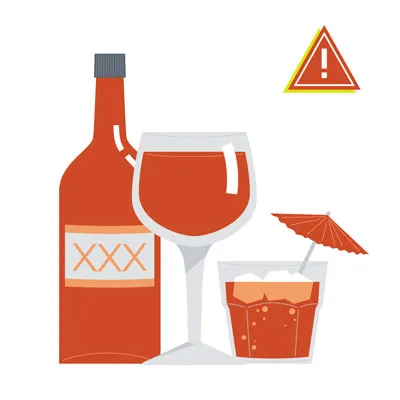 Alcoholic beverages can be deadly for dogs.
Alcoholic beverages can be deadly for dogs.
1. Alcohol
Even small amounts of alcohol can be highly toxic and potentially fatal to dogs. Due to their smaller body size and different metabolic rates, dogs process alcohol much less efficiently than humans. This means that substances like ethanol can rapidly accumulate in their system, leading to severe poisoning. Symptoms of alcohol poisoning in dogs include vomiting, disorientation, staggering, excessive drooling, difficulty breathing, a drop in body temperature, seizures, coma, and even death. Any product containing alcohol, including alcoholic beverages, raw bread dough, or even certain household cleaners, should be kept strictly out of reach.
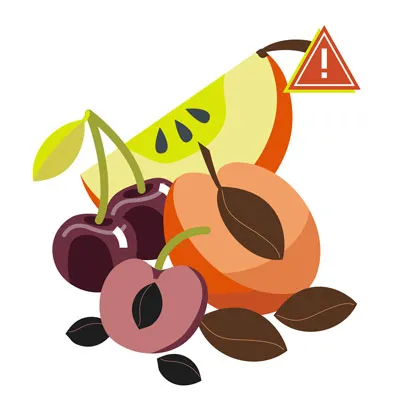 Apple, apricot, cherry, and plum pits contain cyanide.
Apple, apricot, cherry, and plum pits contain cyanide.
2. Apple, Apricot, Cherry, and Plum Seeds/Pits
While the fleshy part of apples (without the core and seeds) can be a safe treat, the seeds are highly problematic. Apple seeds, along with the pits and seeds of apricots, cherries, peaches, and plums, contain cyanide, a potent toxin. Although a small amount might not be immediately dangerous, cumulative exposure or ingestion of a large quantity can be very harmful. Cyanide interferes with the body’s ability to carry oxygen to cells, leading to symptoms such as dilated pupils, difficulty breathing, bright red gums, shock, and potentially death. Beyond chemical toxicity, the hard pits themselves pose a choking hazard and can cause gastrointestinal obstruction if swallowed whole, which can lead to severe blockages requiring veterinary intervention.
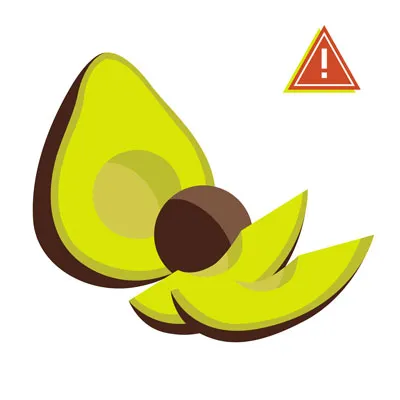 Avocados contain persin, which is harmful to some animals.
Avocados contain persin, which is harmful to some animals.
3. Avocado
Avocados are generally not recommended for dogs. They contain a fungicidal toxin called persin, which is present in the fruit, pit, leaves, and bark. While the toxicity of persin to dogs is often debated and seems to be less severe than in some other animals (like birds and horses), it’s still best to err on the side of caution. Some dogs may experience gastrointestinal upset, including vomiting and diarrhea. More significantly, the large, hard avocado pit presents a serious choking hazard and can cause life-threatening gastrointestinal obstruction if ingested. Therefore, it’s safest to completely avoid feeding your dog any part of an avocado.
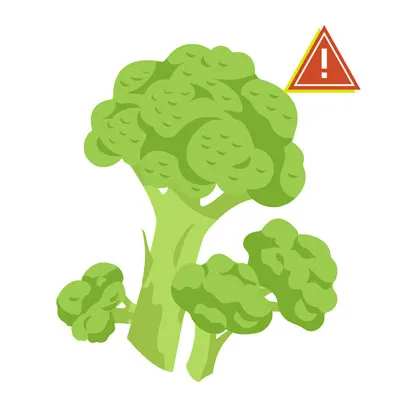 Broccoli in large amounts can be harmful to dogs.
Broccoli in large amounts can be harmful to dogs.
4. Broccoli
Broccoli contains isothiocyanates, compounds that can cause gastrointestinal irritation in dogs, particularly when consumed in large quantities. While a very small, occasional piece of cooked broccoli might not pose a significant threat to some dogs, it’s generally best to limit or avoid it. Large amounts can lead to severe abdominal pain, excessive gas, and diarrhea. Additionally, the fibrous stalks of broccoli can present a choking hazard, especially for smaller dogs, or cause an intestinal blockage. Given the abundance of other demonstrably safe and healthy vegetable alternatives, choosing a different treat is a prudent approach.
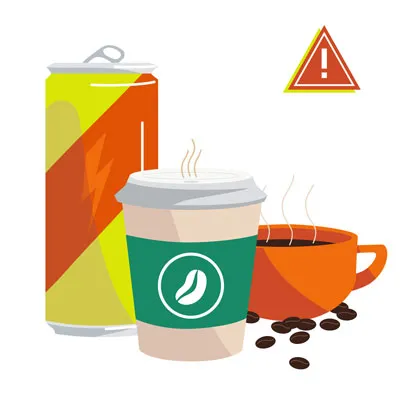 Caffeine, especially coffee grounds, is highly toxic to dogs.
Caffeine, especially coffee grounds, is highly toxic to dogs.
5. Caffeine and Coffee Grounds
Caffeine, a methylxanthine, is highly toxic to dogs and can cause severe health problems, including fatality. Dogs are far more sensitive to the effects of caffeine than humans. Ingesting caffeine, whether from coffee beans, coffee grounds, tea, soda, energy drinks, or certain medications, can lead to a range of severe symptoms. These include hyperactivity, restlessness, increased heart rate (tachycardia), abnormal heart rhythms (arrhythmia), tremors, seizures, vomiting, diarrhea, elevated body temperature, and collapse. The severity of symptoms depends on the amount of caffeine ingested and the dog’s size, but even small amounts can be dangerous. Immediate veterinary attention is crucial if your dog consumes caffeine.
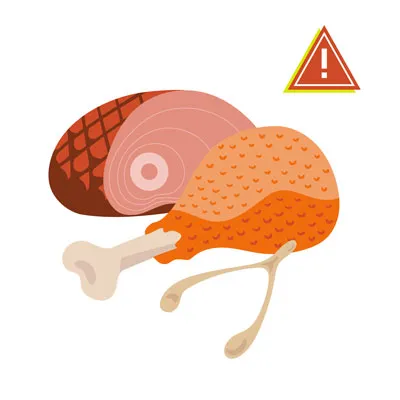 Fatty cuts of meat can cause pancreatitis in dogs.
Fatty cuts of meat can cause pancreatitis in dogs.
6. Chicken and Turkey Skin, Ham, and Other Fatty Cuts of Meat
Feeding your dog fatty cuts of meat, such as chicken or turkey skin, ham, bacon, or highly marbled beef, is strongly discouraged. These items are exceptionally high in fat, which can trigger acute pancreatitis in dogs. Pancreatitis is a painful and potentially life-threatening inflammation of the pancreas, an organ crucial for digestion and blood sugar regulation. Symptoms often include severe abdominal pain, vomiting, diarrhea, loss of appetite, lethargy, and a hunched posture.
Furthermore, poultry bones (chicken, turkey) should never be given to dogs, especially cooked bones. Cooked bones become brittle and can splinter easily, posing significant risks. These splinters can cause internal damage by puncturing the esophagus, stomach, or intestines, leading to severe internal bleeding, peritonitis (a fatal abdominal infection), or intestinal obstruction. Raw bones also carry risks of choking and internal injury, as well as bacterial contamination like Salmonella. It is always safer to discard fatty scraps and bones rather than offering them as treats.
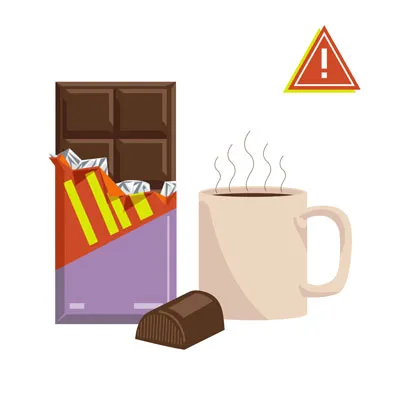 Chocolate is a common and dangerous toxin for dogs.
Chocolate is a common and dangerous toxin for dogs.
7. Chocolate
Chocolate is one of the most well-known and dangerous toxins for dogs, especially during holidays when it’s frequently present in homes. The toxic compounds in chocolate are methylxanthines, primarily theobromine and, to a lesser extent, caffeine. Dogs metabolize these substances much slower than humans, allowing them to accumulate to dangerous levels in their system. The darker and more bitter the chocolate (e.g., baker’s chocolate, dark chocolate), the higher its concentration of theobromine, making it more lethal. Even milk chocolate or white chocolate can cause issues if ingested in large enough quantities. Additionally, some sugar-free chocolates contain xylitol, an artificial sweetener that is also highly toxic to dogs.
Symptoms of chocolate toxicity vary with the amount and type consumed but can include hyperactivity, restlessness, excessive thirst, vomiting, diarrhea, abdominal pain, panting, tremors, seizures, abnormal heart rhythms, and in severe cases, internal bleeding, a coma, or even death. Pancreatitis is also a potential complication due to the fat content. If your dog ingests any amount of chocolate, regardless of size or type, it is considered an emergency, and you should contact your veterinarian immediately for guidance.
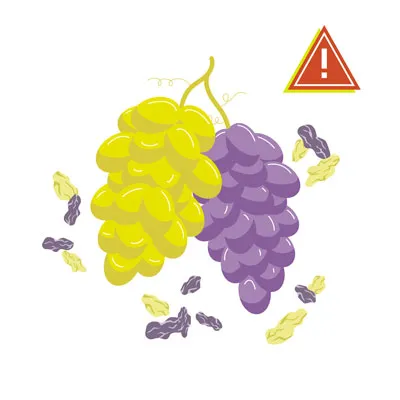 Grapes and raisins can cause acute kidney failure in dogs.
Grapes and raisins can cause acute kidney failure in dogs.
8. Grapes and Raisins
Grapes and raisins are exceptionally dangerous for dogs and can cause acute kidney failure, even in small amounts. The exact toxic mechanism is not fully understood but is linked to tartaric acid. Some dogs are highly sensitive, experiencing severe symptoms from just a few pieces, while others might tolerate slightly more, though there’s no safe threshold. All forms of grapes and raisins – fresh, dried, in baked goods, or grape juice – are considered toxic.
Symptoms of grape or raisin poisoning typically begin within hours of ingestion and can include vomiting, diarrhea (which may contain undigested grapes/raisins), lethargy, abdominal pain, loss of appetite, and dehydration. As kidney damage progresses, dogs may show increased thirst and urination, followed by a decrease or complete cessation of urine production. Without prompt veterinary treatment, kidney failure can be irreversible and fatal. Due to the severe and unpredictable nature of this toxicity, any ingestion of grapes or raisins should be treated as a medical emergency.
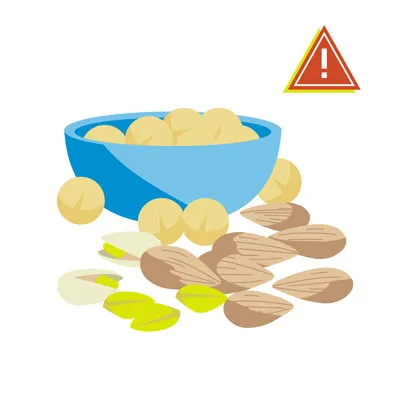 Macadamia nuts can cause weakness and neurological symptoms.
Macadamia nuts can cause weakness and neurological symptoms.
9. Macadamia Nuts, Almonds, and Pistachios
Macadamia nuts are highly toxic to dogs, causing a specific syndrome that includes weakness, paralysis of the hindquarters, tremors, joint pain, vomiting, and fever. The exact toxic compound and mechanism are unknown, but symptoms can appear within 12 hours of ingestion. As few as six nuts can cause severe poisoning in a small dog, and the effects can last for 24-48 hours. While usually not fatal, macadamia nut poisoning is very painful and distressing for dogs.
Other nuts, like almonds and pistachios, are not generally considered toxic in the same way macadamia nuts are, but they still pose significant risks. Their high fat content can lead to gastrointestinal upset, including vomiting and diarrhea, and potentially contribute to pancreatitis if consumed frequently or in large quantities. Furthermore, nuts are dense and can be a choking hazard, particularly for smaller breeds. Flavored or salted nuts introduce additional dangers due to excessive salt or other seasonings. Therefore, it’s best to avoid feeding dogs any type of nut.
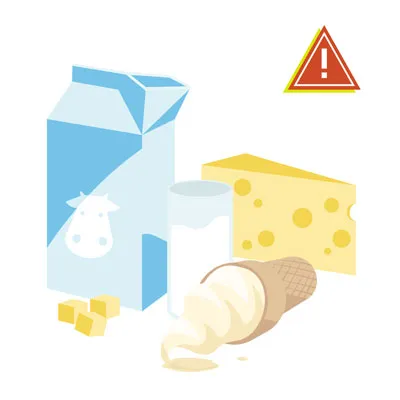 Many dogs are lactose intolerant and can suffer from dairy products.
Many dogs are lactose intolerant and can suffer from dairy products.
10. Milk and Dairy Products
The ability of dogs to tolerate milk and dairy products varies greatly. Many adult dogs are lactose intolerant because they lack sufficient lactase, the enzyme needed to break down lactose (milk sugar). Ingesting dairy can lead to gastrointestinal upset such as diarrhea, vomiting, and excessive gas. While some dogs might handle small amounts without issue, it’s often a source of discomfort.
Products like ice cream are particularly problematic due to their high sugar and fat content, which can cause digestive issues and contribute to weight gain and potentially pancreatitis. Instead of ice cream, consider freezing healthy, dog-safe fruits for a cooling treat. Small quantities of lower-fat cheese can sometimes be given as a treat if your dog shows no signs of lactose intolerance, but even then, moderation is key due to its fat and calorie content. Always observe your dog’s reaction and consult your veterinarian about appropriate dairy intake.
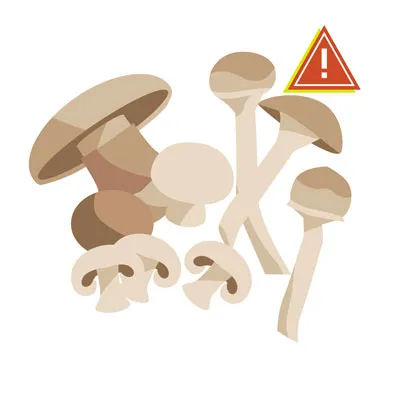 Mushrooms from the wild are highly dangerous.
Mushrooms from the wild are highly dangerous.
11. Mushrooms
It is generally best to avoid feeding your dog any type of mushroom due to the wide variety of toxic fungi and the difficulty in distinguishing safe from dangerous species. While commercially grown white button mushrooms from a grocery store might be harmless if thoroughly washed and cooked, the risk associated with wild mushrooms is immense. Wild mushrooms can contain a diverse range of toxins, some of which are rapidly absorbed and can cause severe symptoms or death within hours.
Toxic mushrooms can lead to a broad spectrum of clinical signs, including gastrointestinal upset (vomiting, diarrhea, abdominal pain), neurological symptoms (tremors, disorientation, hallucinations, seizures), liver failure, kidney failure, and damage to red blood cells. Given the severe potential consequences and the difficulty in identification, it’s safest to assume all mushrooms found outdoors are toxic and to prevent your dog from ingesting any. If you suspect your dog has eaten a wild mushroom, seek immediate veterinary help.
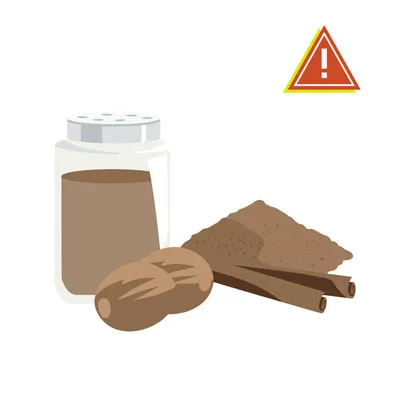 Nutmeg contains myristicin, which is toxic to dogs.
Nutmeg contains myristicin, which is toxic to dogs.
12. Nutmeg and Cinnamon
Nutmeg contains myristicin, a psychoactive compound that can be toxic to dogs, especially in larger doses or in smaller breeds. Ingestion can lead to symptoms such as hallucinations, disorientation, increased heart rate, high blood pressure, abdominal pain, and severe vomiting. While a tiny amount accidentally ingested in a baked good might not cause serious harm, it’s prudent to keep all nutmeg-containing foods out of your dog’s reach. If you suspect your dog has eaten nutmeg, contact your veterinarian for advice.
Cinnamon is not considered toxic in small amounts, but it can cause irritation to a dog’s mouth and digestive tract if ingested in powdered form or in larger quantities. Inhaling powdered cinnamon can also lead to coughing, choking, and lung irritation. Furthermore, large amounts of cinnamon may potentially cause a temporary drop in blood sugar, which can be dangerous, particularly for diabetic dogs. While a small amount in a human food might not be immediately dangerous, it offers no nutritional benefit and can cause discomfort, so it’s generally best to avoid it.
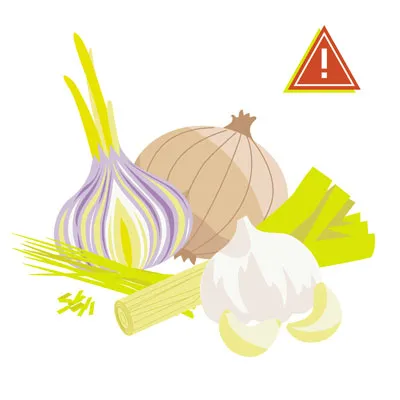 Onions, garlic, chives, and leeks are toxic to red blood cells.
Onions, garlic, chives, and leeks are toxic to red blood cells.
13. Onions, Garlic, Chives, and Leeks
All members of the allium family—onions, garlic, chives, and leeks—are highly toxic to dogs (and cats). These plants contain compounds called N-propyl disulfide and thiosulphates, which can cause oxidative damage to red blood cells, leading to hemolysis (the destruction of red blood cells) and anemia. This damage reduces the blood’s ability to carry oxygen, resulting in weakness, lethargy, increased heart rate, pale gums, and difficulty breathing.
The toxicity is not limited to raw forms; cooked, dehydrated, or powdered versions of these ingredients are equally dangerous. Onion and garlic powders are potent and often hidden in many processed human foods, including sauces, gravies, and even baby food, making label-reading crucial. Certain Japanese breeds, such as Akitas and Shiba Inus, are particularly sensitive. Symptoms may not appear immediately but can manifest days after ingestion. Any exposure to these ingredients warrants veterinary consultation due to the potential for severe, life-threatening anemia.
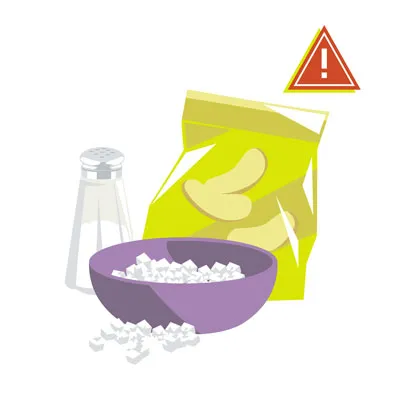 Excessive salt can cause sodium ion poisoning in dogs.
Excessive salt can cause sodium ion poisoning in dogs.
14. Salt
While dogs require some salt in their diet, excessive amounts of sodium can be highly dangerous, leading to sodium ion poisoning (hypernatremia). Ingesting too much salt can disrupt the fluid balance in a dog’s cells, causing dehydration, kidney damage, and neurological issues. Common sources of concern include salty snacks like potato chips, pretzels, salted nuts, cured meats, and even homemade play dough or rock salt used for de-icing.
Symptoms of salt poisoning can include excessive thirst and urination, vomiting, diarrhea, lethargy, loss of coordination, tremors, seizures, and in severe cases, a coma or even death. It’s crucial to ensure your dog has access to fresh water at all times to help mitigate the effects of accidental high sodium intake. Always avoid sharing salty human foods with your dog.
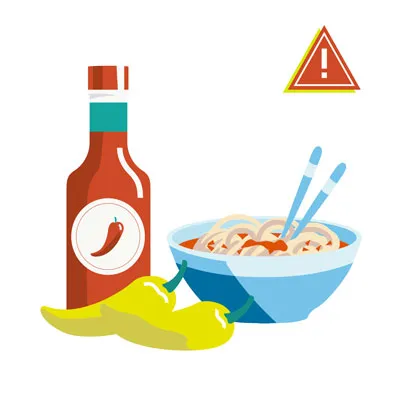 Spicy foods can cause severe gastrointestinal distress.
Spicy foods can cause severe gastrointestinal distress.
15. Spicy Food
Spicy foods, containing capsaicin (the active compound in chili peppers), are not toxic in the same way as some other items on this list, but they can cause significant gastrointestinal distress and discomfort for dogs. Dogs’ digestive systems are not accustomed to processing capsaicin, which leads to irritation of the mouth, throat, esophagus, and stomach lining.
Symptoms can include excessive drooling, vomiting, diarrhea, severe abdominal pain, excessive thirst, and general discomfort. In some cases, consuming very spicy foods can even lead to stomach ulcers or exacerbate existing gastrointestinal conditions. The painful experience can also cause behavioral changes or make dogs apprehensive about eating in the future. To spare your dog from unnecessary pain and potential veterinary visits, always keep spicy human foods far out of reach.
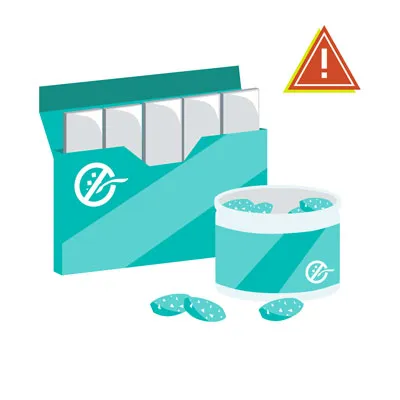 Xylitol is a deadly sweetener for dogs.
Xylitol is a deadly sweetener for dogs.
16. Sugar-Free Gum and Candy (Xylitol)
Xylitol is an artificial sweetener found in a rapidly increasing number of human products, including sugar-free gum, candies, mints, baked goods, peanut butter, toothpaste, and some medications. It is profoundly toxic to dogs and can be deadly even in small quantities. In dogs, xylitol causes a rapid and severe release of insulin, leading to a sudden and drastic drop in blood sugar (hypoglycemia). This can occur within 10-60 minutes of ingestion and can be life-threatening.
Symptoms of xylitol poisoning include lethargy, weakness, disorientation, stumbling, vomiting, tremors, and seizures due to the low blood sugar. In some cases, particularly with higher doses, xylitol can also cause acute liver failure, which has a very poor prognosis. Because of its prevalence in so many products and its extreme toxicity, it is crucial to diligently check ingredient labels for xylitol before sharing any human food with your dog. Any suspected ingestion of xylitol requires immediate emergency veterinary care.
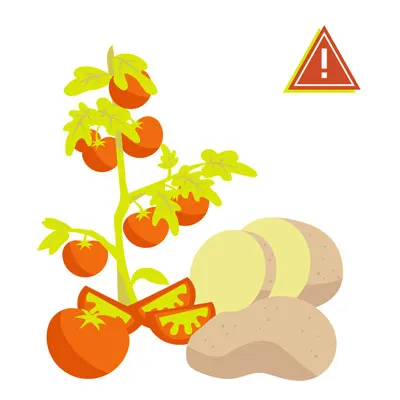 Green parts of tomatoes and raw potatoes contain solanine.
Green parts of tomatoes and raw potatoes contain solanine.
17. Tomatoes and Raw Potatoes
These common vegetables fall into a “safe in some forms, unsafe in others” category. Ripe, red tomatoes are generally considered safe for dogs in moderation. However, the green parts of the tomato plant—leaves, stems, and unripe green tomatoes—contain solanine, a glycoalkaloid toxin. Solanine can cause gastrointestinal upset (vomiting, diarrhea), lethargy, weakness, and confusion. It’s best to remove all green parts and stick to small amounts of fully ripened, red tomatoes.
Similarly, cooked potatoes (baked or boiled, plain) are generally safe for dogs in small quantities. However, raw potatoes, especially green-tinged ones or potato sprouts, also contain solanine. Ingesting raw potatoes can lead to the same symptoms as green tomatoes. Additionally, cooked potato skins can be difficult for dogs to digest and may cause gastrointestinal upset. Always ensure potatoes are cooked thoroughly, peeled, and free of any additives before offering a tiny piece to your dog.
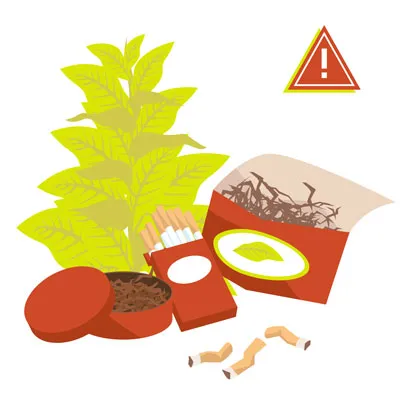 Tobacco products contain nicotine, which is very dangerous for dogs.
Tobacco products contain nicotine, which is very dangerous for dogs.
18. Tobacco
Tobacco products, including cigarettes, cigars, chewing tobacco, nicotine patches, e-liquids, and even cigarette butts, are highly dangerous and toxic to dogs due to their nicotine content. Nicotine is a potent neurotoxin that affects the nervous system and heart. Dogs are naturally curious and may ingest discarded tobacco products, which can lead to rapid and severe poisoning.
Symptoms of nicotine poisoning can appear quickly and include vomiting, diarrhea, drooling, constricted pupils, lethargy, agitation, rapid or labored breathing, abnormal heart rate, wobbliness, muscle weakness, tremors, and seizures. In severe cases, especially with high doses or in small dogs, nicotine poisoning can lead to blue gums, coma, respiratory arrest, and be fatal. Given the severe risks, if your dog ingests any tobacco product, immediate veterinary attention is critical. Act quickly and take your dog to the emergency vet.
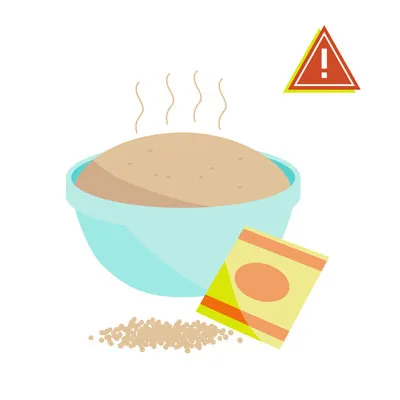 Yeast and raw dough can cause gastric distension and alcohol poisoning.
Yeast and raw dough can cause gastric distension and alcohol poisoning.
19. Yeast and Raw Dough
Raw dough containing yeast is unsafe for dogs for two primary reasons, both of which can be life-threatening. First, once ingested, the warm, moist environment of a dog’s stomach provides an ideal setting for the yeast to ferment and the dough to rise. This expansion can cause severe bloating, gastric distension, and potentially a condition called gastric dilation-volvulus (GDV) or bloat, where the stomach twists. GDV is a medical emergency requiring immediate surgical intervention to prevent rupture and death.
Second, as the yeast ferments, it produces ethanol (alcohol). This results in alcohol toxicity, which dogs are highly susceptible to. Symptoms of alcohol poisoning, as described earlier, can include disorientation, vomiting, tremors, difficulty breathing, and can quickly progress to coma and death. Therefore, any ingestion of raw yeast dough demands immediate veterinary care. Never allow your dog access to unbaked bread or pizza dough.
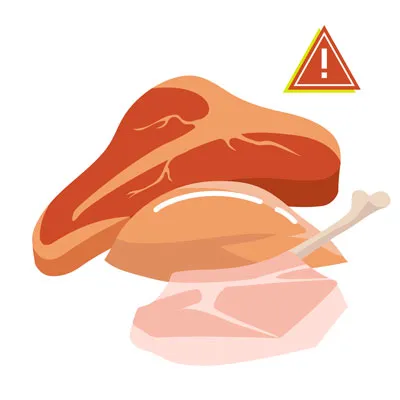 Raw meat can contain harmful bacteria and parasites.
Raw meat can contain harmful bacteria and parasites.
20. Raw Meat
While some proponents advocate for raw food diets, feeding your dog raw or undercooked meat carries significant risks. Raw meat can harbor harmful bacteria such as Salmonella, E. coli, Listeria, and Campylobacter, which can cause severe gastrointestinal illness in dogs (and can also be transmitted to humans through contact). Symptoms of bacterial infection can include vomiting, diarrhea (often bloody), fever, lethargy, and dehydration.
Beyond bacterial concerns, raw meat can also contain parasites. Furthermore, raw bones present in unprocessed meat can pose choking hazards or cause internal injuries such if splintered or swallowed whole, leading to punctures in the digestive tract or obstructions. To ensure your dog’s safety and prevent foodborne illnesses, always cook meat thoroughly before offering it to your pet.
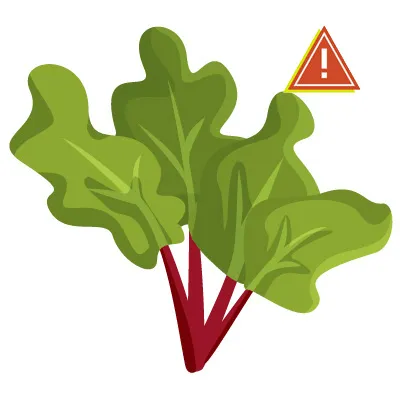 Rhubarb leaves contain toxic oxalate crystals.
Rhubarb leaves contain toxic oxalate crystals.
21. Rhubarb
Rhubarb, a plant commonly used in human desserts like pies, is unsafe for dogs, particularly its leaves. Rhubarb leaves contain high concentrations of soluble calcium oxalate crystals. When ingested in sufficient quantities, these crystals can bind with calcium in the body, leading to a dangerous drop in blood calcium levels (hypocalcemia) and potentially causing acute renal failure.
Symptoms of rhubarb poisoning can include excessive drooling, tremors, weakness, vomiting, diarrhea, changes in thirst and urination, and bloody urine. While the stalks are less problematic, it’s best to avoid all parts of the plant to eliminate any risk. If your dog ingests rhubarb, especially the leaves, consult a veterinarian immediately.
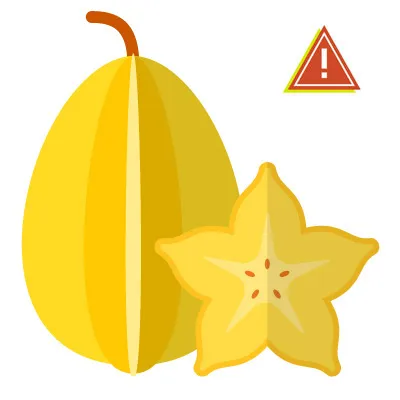 Star fruit contains soluble calcium oxalate crystals, like rhubarb.
Star fruit contains soluble calcium oxalate crystals, like rhubarb.
22. Star Fruit
Similar to rhubarb, star fruit (carambola) also contains soluble calcium oxalate crystals. These crystals, when ingested by dogs, can lead to the same adverse effects as rhubarb, including kidney damage and hypocalcemia. Symptoms can range from gastrointestinal upset to more severe signs like tremors, weakness, and changes in urination. Given these risks, star fruit is another item that should be strictly kept out of your dog’s diet. It is always better to be safe and choose other dog-friendly fruits.
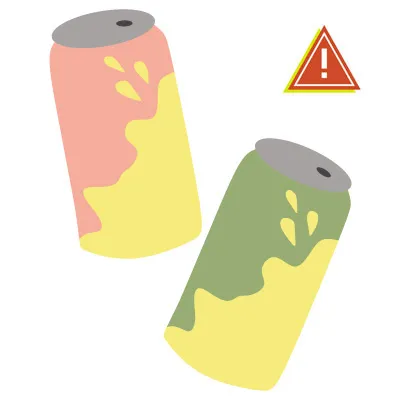 Flavored and seltzer water may contain harmful additives for dogs.
Flavored and seltzer water may contain harmful additives for dogs.
23. Flavored Water and Seltzer Water
While plain, fresh water is essential for your dog’s hydration, flavored water and seltzer water should be avoided. Flavored waters often contain added sugars, artificial sweeteners (like xylitol, which is deadly for dogs), artificial colors, and other additives that are unnecessary and potentially harmful to your dog’s health. Sugar can contribute to weight gain and dental problems, while xylitol can cause rapid blood sugar drops and liver failure.
Plain seltzer or carbonated water, while not inherently toxic, can lead to excessive gas and bloating, causing discomfort and potentially exacerbating conditions like bloat in susceptible breeds. In emergency situations, a very small amount of plain seltzer might be used to induce vomiting under strict veterinary guidance, but it is not recommended for regular consumption. Always stick to providing your dog with clean, plain drinking water.
13 Safe Human Foods for Dogs
While the list of forbidden foods for dogs is extensive, there are plenty of human foods that are safe, healthy, and can be given as occasional treats in moderation. These options provide valuable nutrients and a delightful variety to your dog’s diet without any of the risks associated with toxic foods. Always ensure these foods are prepared plain, without seasonings, and cut into appropriate, bite-sized pieces to prevent choking.
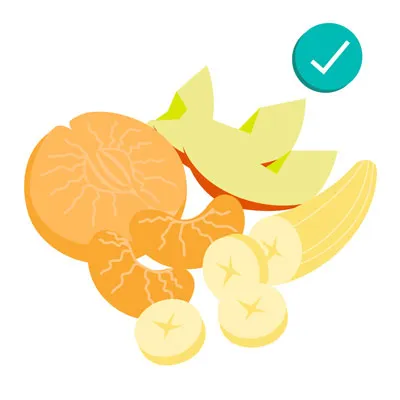 Apples, oranges, and bananas can be safe and healthy treats for dogs.
Apples, oranges, and bananas can be safe and healthy treats for dogs.
1. Apples, Oranges, and Bananas
- Apples: A fantastic source of vitamins A and C, and fiber. Always remove the core and seeds, as they contain cyanide. Cut the apple into small, manageable slices.
- Oranges: Rich in vitamin C. Give in very small amounts, peeled and deseeded, as the acidity can upset some dogs’ stomachs. Avoid the rind.
- Bananas: High in potassium, vitamins, and fiber. Offer in moderation and always peel them. They are calorie-dense, so feed sparingly as a treat.
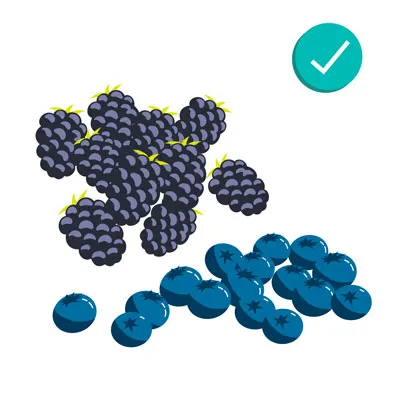 Blueberries and blackberries are packed with antioxidants.
Blueberries and blackberries are packed with antioxidants.
2. Blueberries and Blackberries
These berries are small, easy for dogs to eat, and packed with health benefits.
- Blueberries: An excellent source of antioxidants, fiber, and Vitamin C. They are known to boost canine health and are often enjoyed by dogs.
- Blackberries: Also rich in antioxidants, vitamins C and K, and fiber. Offer in moderation, as too many can cause an upset stomach.
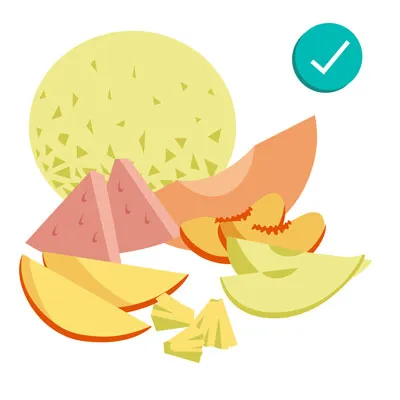 Melons and stone fruits can be refreshing treats for dogs.
Melons and stone fruits can be refreshing treats for dogs.
3. Cantaloupe, Mango, Peaches, Pears, Pineapples, and Watermelons
Many fruits offer refreshing and nutritious treats for your dog, especially during warmer weather.
- Cantaloupe: High in vitamins A and C, and a good source of water. Remove the rind and seeds before serving.
- Watermelon: Mostly water, making it a hydrating treat. Ensure all seeds (even pale ones from seedless varieties) and the rind are removed to prevent choking and digestive upset.
- Mangoes: Provide vitamins A, B6, C, and E. Always peel and remove the large pit.
- Peaches: A good source of vitamins A and fiber. Remove the pit, as it contains cyanide and is a choking hazard.
- Pears: Rich in vitamins C and K, and fiber. Remove the core and seeds.
- Pineapples: Packed with vitamins, minerals, and fiber. Peel and remove the tough core, offering only small chunks of the fleshy part.
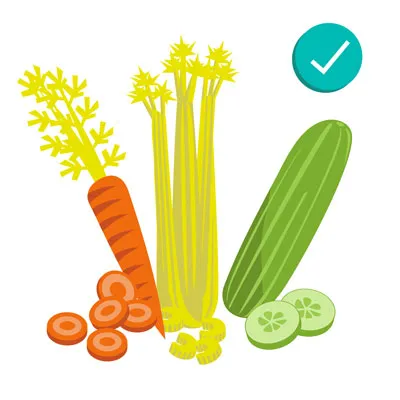 Carrots, cucumbers, and celery are low-calorie and crunchy options.
Carrots, cucumbers, and celery are low-calorie and crunchy options.
4. Carrots, Cucumber, and Celery
These crunchy vegetables and fruits are excellent, low-calorie options, especially beneficial for dogs needing to manage their weight.
- Carrots: Great for dental health due to their crunch, and loaded with vitamin A and fiber. Offer raw or cooked, cut into bite-sized pieces.
- Cucumbers: Mostly water, very low in calories, and rich in vitamins K, C, and B1. Perfect for hydration and a healthy snack.
- Celery: Offers a satisfying crunch and can help freshen breath. Contains vitamins A, B, and C, and is low in fat and cholesterol. Cut into small pieces to prevent choking.
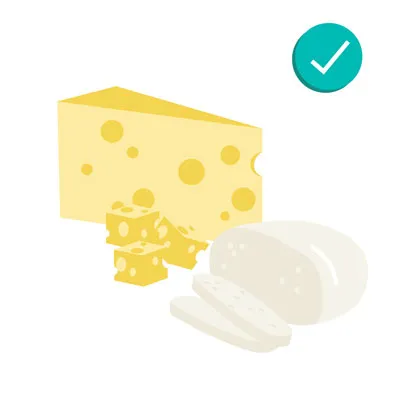 Small amounts of low-fat cheese can be an acceptable treat for some dogs.
Small amounts of low-fat cheese can be an acceptable treat for some dogs.
5. Cheese
While dairy can be problematic for lactose-intolerant dogs, small amounts of low-fat cheese can be an acceptable treat for those who tolerate it well. Cheese is a good source of protein and calcium. Always choose low-fat varieties like mozzarella or cottage cheese over high-fat options, which can contribute to pancreatitis. Introduce small quantities gradually and observe for any signs of digestive upset.
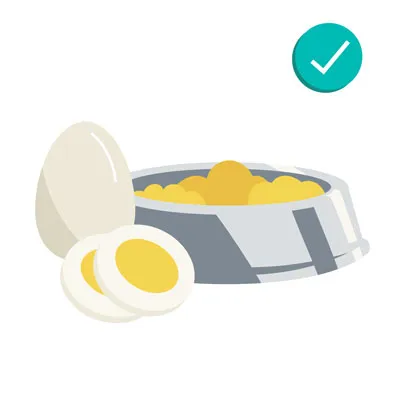 Fully cooked eggs are a great source of protein.
Fully cooked eggs are a great source of protein.
6. Eggs
Fully cooked eggs are an excellent source of protein, essential amino acids, and fatty acids. Scrambled or boiled eggs (plain, without salt, butter, or seasonings) can be a nutritious and easily digestible treat for dogs, often recommended for soothing an upset stomach. Ensure eggs are always thoroughly cooked to eliminate any risk of Salmonella contamination.
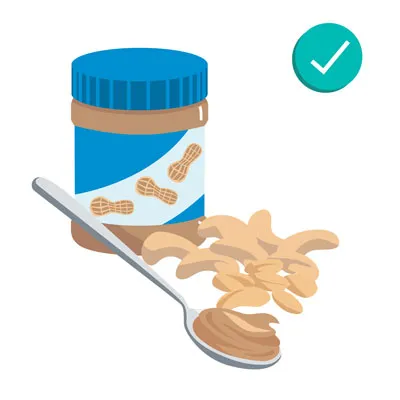 Peanuts, peanut butter, and cashews are safe in moderation and unsalted.
Peanuts, peanut butter, and cashews are safe in moderation and unsalted.
7. Peanuts, Peanut Butter, and Cashews
- Peanuts and Cashews: Can be safe in small quantities, provided they are unsalted, unflavored, and unspiced. Due to their high fat content, they should be given sparingly to avoid gastrointestinal upset or weight gain.
- Peanut Butter: A popular treat, but crucial precautions are needed. Choose unsalted, plain peanut butter, and absolutely avoid any variety containing xylitol, a common artificial sweetener that is highly toxic to dogs. In moderation, it’s a good source of protein and healthy fats. Always check labels carefully.
 Plain popcorn and corn (off the cob) are safe treats for dogs.
Plain popcorn and corn (off the cob) are safe treats for dogs.
8. Popcorn and Corn
- Popcorn: Air-popped, plain popcorn (without butter, oil, or salt) can be a fun, crunchy treat. Ensure all unpopped kernels are removed, as they pose a choking hazard and can damage teeth.
- Corn: Plain corn, removed from the cob, is safe for dogs. It’s a source of carbohydrates, fiber, and protein. Avoid corn on the cob as the cob itself can cause severe intestinal obstruction.
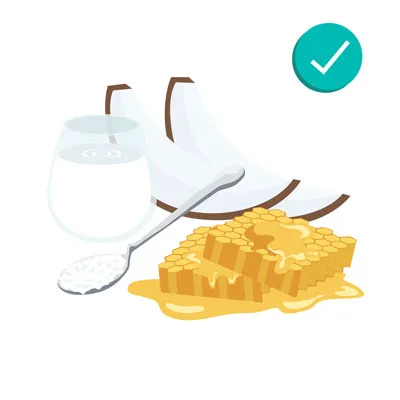 Coconut and honey offer various health benefits in small doses.
Coconut and honey offer various health benefits in small doses.
9. Coconut and Honey
- Coconut: In small amounts, coconut (flesh, milk, and oil) is generally fine. It contains lauric acid, which may help support the immune system and skin health. However, some dogs might experience mild gastrointestinal upset from fresh coconut or coconut milk, so introduce cautiously. Avoid the furry outer shell due to choking risks, and do not give coconut water as it’s not recommended for dogs.
- Honey: In moderation, honey is safe and contains vitamins, minerals, and antioxidants. It can be a natural energy booster.
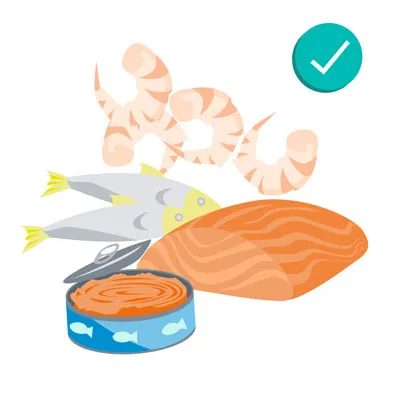 Cooked shrimp and fish provide excellent protein and omega-3s.
Cooked shrimp and fish provide excellent protein and omega-3s.
10. Shrimp and Fish
- Shrimp: Plain, fully cooked shrimp (peeled, deveined, with head, tail, and legs removed) is a great low-fat, high-protein treat. Avoid any seasoned, salted, or buttered shrimp.
- Fish: Cooked fish, especially salmon and sardines, are excellent sources of omega-3 fatty acids, which benefit skin, coat, and joint health. Ensure fish is plain, fully cooked, and completely boneless. Limit fish to no more than twice a week to avoid excessive mercury intake. Plain, canned tuna (packed in water, not oil, and low sodium) can be given in moderation.
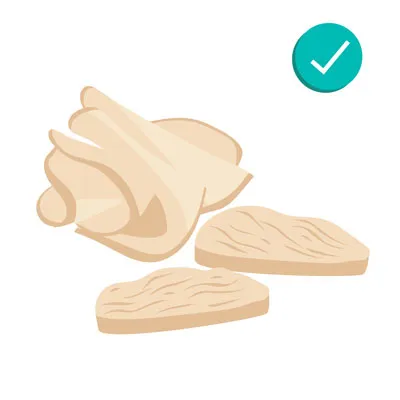 Plain, cooked turkey is a healthy protein source.
Plain, cooked turkey is a healthy protein source.
11. Turkey
Plain, fully cooked turkey meat, without skin, bones, or excessive fat, is a healthy and safe source of protein for dogs. Avoid any seasoned, brined, or salted turkey, as these additives can be harmful. Small, bite-sized pieces can be a delicious and beneficial treat. Ensure it is not mixed with any stuffing or other ingredients that might be toxic.
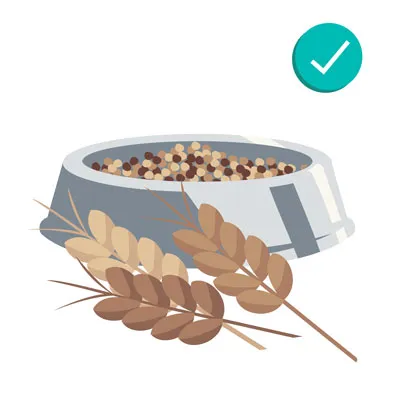 Grains like wheat and quinoa are acceptable for dogs without allergies.
Grains like wheat and quinoa are acceptable for dogs without allergies.
12. Grains, Wheat, and Quinoa
Contrary to some popular myths, grains such as wheat, rice, and corn can be a healthy part of a dog’s diet, provided they don’t have a specific allergy. In moderation, these provide carbohydrates for energy and fiber. Quinoa is a particularly nutritious grain, offering a complete protein source along with essential amino acids. Always cook grains thoroughly and serve plain. Monitor your dog for any signs of allergic reactions, although true grain allergies are less common than often perceived.
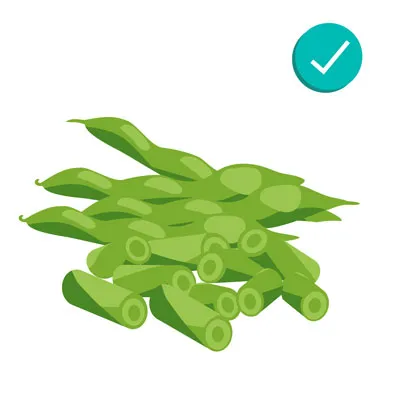 Green beans are a healthy, low-calorie snack.
Green beans are a healthy, low-calorie snack.
13. Green Beans
Many dogs absolutely love green beans, making them a safe, tasty, and exceptionally healthy treat. They are low in calories, high in fiber, and contain vitamins K, C, and A. Green beans can be served raw, steamed, or from a can (ensure canned varieties are plain, low-sodium, and without added spices or oils). Cut them into small, bite-sized pieces to prevent choking, especially for smaller dogs. They are an excellent option for dogs on a weight management plan.
What Dogs Are Most at Risk if They Consume Toxic Foods?
While all dogs are vulnerable to the dangers of toxic human foods, certain demographics and health conditions can significantly increase their risk and the severity of poisoning. Understanding these factors helps pet owners be even more vigilant.
- Small Breeds vs. Large Breeds: Smaller dogs are generally at much greater risk from ingesting toxic substances. Due to their lower body weight, even a small quantity of a toxin can result in a higher concentration in their system, leading to more severe symptoms faster. For instance, a chocolate bar that might cause mild upset in a large Golden Retriever could be lethal for a tiny Chihuahua.
- Puppies: Young dogs have developing digestive and immune systems that are less efficient at processing and eliminating toxins. Their exploratory nature also makes them more prone to ingesting dangerous items they shouldn’t. Furthermore, their rapid growth and less developed organs mean they are more susceptible to severe damage from toxic substances, including bacterial infections from raw foods.
- Elderly Dogs: Senior dogs often have compromised immune systems, reduced organ function (e.g., liver and kidneys, which are crucial for detoxification), or underlying health conditions. These factors can make them less resilient to the effects of toxins and slow their recovery, putting them at a higher risk for severe complications or prolonged illness.
- Dogs with Pre-existing Conditions: Dogs with chronic health issues such as diabetes, kidney disease, liver disease, or gastrointestinal sensitivities are at elevated risk. For example, foods that cause blood sugar fluctuations are extremely dangerous for diabetic dogs, and toxins that stress the kidneys or liver can rapidly worsen existing organ failure. Always discuss specific dietary concerns with your veterinarian if your dog has any pre-existing health conditions.
How To Prevent Dogs from Eating Toxic Foods
Accidents can happen quickly, but proactive measures can significantly minimize the risk of your beloved dog ingesting unsafe human foods. A vigilant and prepared approach is the best defense against pet poisoning.
1. Store Foods Out of Reach
The most fundamental prevention strategy is to keep all potentially toxic foods completely inaccessible to your dog. This means storing dangerous items on high shelves, in secure pantries, or in cabinets with childproof latches that your clever canine can’t open. Be especially mindful of counter surfing dogs; they are incredibly adept at reaching items left unattended. Don’t underestimate your dog’s ability to get into things, and remember that even seemingly harmless items like a discarded apple core or a forgotten piece of gum can be dangerous.
2. Avoid Feeding Dogs from Your Plate
Resist the urge to feed your dog scraps directly from your plate or while you’re cooking in the kitchen, even if it’s just a small “treat.” This practice teaches dogs that human food is fair game and encourages begging and counter surfing, increasing the likelihood of them accidentally ingesting something harmful when you’re not looking. It’s safest to only provide your dog with treats specifically formulated for canines, offered at designated times and away from human meal areas.
3. Educate Family Members and Guests
Ensure everyone in your household, including children and guests, understands the strict rules about feeding your dog human food. Explain clearly which foods are dangerous and emphasize that, no matter how much your dog begs or gives “sad eyes,” they should never be given table scraps or allowed access to human food. Provide a list of safe treats they can give (from the “Foods Safe for Dogs” section) if they wish to spoil your pup, but reiterate the importance of not sharing meals.
4. Be Careful During Holidays and Gatherings
Holidays and social gatherings are prime times for accidental pet poisonings. The increased activity, abundance of food, and often relaxed vigilance can create dangerous opportunities for curious dogs. Be extra cautious during events like Thanksgiving, Christmas, Halloween, and parties. Keep all food, especially celebratory dishes that may contain many toxic ingredients (like onions, garlic, grapes, chocolate), completely out of reach. Assign a “dog sitter” if possible, or confine your dog to a safe, quiet space with their own treats during meal times to prevent any mishaps. Keep emergency vet contact information readily accessible, as holiday periods often mean altered clinic hours.
What To Do if Your Dog Eats Something Toxic
If, despite all precautions, your dog eats something toxic, immediate and decisive action is critical. The speed of intervention often directly correlates with a positive outcome. Recognizing the signs of distress quickly is the first step.
Familiarize yourself with general symptoms of food toxicity, which can vary widely depending on the substance ingested. These may include:
- Gastrointestinal issues: Vomiting (with or without blood), diarrhea (can be bloody or tarry), excessive drooling, loss of appetite, abdominal pain, bloating, or a hard-feeling stomach (which can indicate a severe, life-threatening condition like bloat).
- Neurological signs: Lethargy, weakness, disorientation, staggering, tremors, muscle twitching, hyperactivity, restlessness, seizures, or coma.
- Cardiovascular symptoms: Increased heart rate, irregular heart rhythm, pale or blue gums.
- Respiratory issues: Difficulty breathing, rapid or labored breathing.
- Other signs: Excessive thirst or urination, changes in body temperature, or unusual behavior.
If you observe any of these symptoms or suspect your dog has ingested a toxic substance, take the following steps:
- Call Your Veterinarian or a Pet Poison Control Center Immediately: Do not wait. Time is of the essence. Have their emergency number readily available. Provide them with as much detail as possible: the specific food ingested, the estimated quantity, the time of ingestion, your dog’s breed, weight, age, and any observed symptoms.
- Gather Information and Evidence: If possible, collect a sample of the substance your dog ate (or its packaging). This can help veterinarians quickly identify the toxin and the appropriate treatment. Note the time of ingestion as accurately as possible.
- Avoid Home Remedies Unless Directed by a Vet: Do NOT attempt to induce vomiting or administer any home remedies (like activated charcoal) without explicit instructions from a veterinary professional. Inducing vomiting can be harmful or even fatal in certain situations (e.g., if the substance is corrosive, sharp, or if the dog is already showing neurological signs). What is safe for one type of toxin might be dangerous for another.
- Follow Veterinary Instructions Precisely: Your vet will guide you on the next steps, which may include bringing your dog in for immediate treatment, monitoring at home, or inducing vomiting safely. Transport your dog calmly and safely to the clinic if advised.
Dog Care Story Can Help You Keep Your Dog Healthy
Navigating the world of human foods and their impact on your dog’s health can be daunting. From hidden household toxins to the myriad of delicious but dangerous human foods, keeping track of what human food dogs shouldn’t eat requires constant vigilance. Dogs, with their innate curiosity and sometimes indiscriminate tastes, will often try to sample anything within reach. However, by adhering to this comprehensive guide and remaining proactive, you can significantly reduce the risks and ensure your dog’s safety.
The good news is that there are many safe and healthy human food options that can be shared in moderation, offering both nutritional benefits and an enjoyable treat experience. Experiment with the safe foods listed, discover your dog’s favorites, and incorporate them responsibly into their diet. When in doubt about any food item, the safest course of action is always to consult with your veterinarian.
Protecting your dog from unexpected toxins and illnesses is a vital part of responsible pet ownership. Pet insurance can provide invaluable peace of mind, helping you manage the financial burden of unforeseen veterinary emergencies, including those arising from accidental poisonings. At Dog Care Story, we believe in empowering pet owners with knowledge and resources to keep their companions healthy and happy. For further assistance and guidance, remember to consult your veterinarian for personalized advice tailored to your dog’s unique needs.
References
- “Top 10 dog poisons,” Hilary Parker (5/2023), WebMD, https://www.webmd.com/pets/dogs/top-10-dog-poisons
- “What happens if a dog eats chocolate?” (10/2023), Colorado State University, https://vetmedbiosci.colostate.edu/vth/animal-health/why-is-chocolate-bad-for-dogs/
- “Fruits and vegetables dogs can or can’t eat,” (3/2024), American Kennel Club, https://www.akc.org/expert-advice/nutrition/fruits-vegetables-dogs-can-and-cant-eat/
- “What to do if your dog drinks alcohol,” Jerry Klein (7/2023), American Kennel Club, https://www.akc.org/expert-advice/vets-corner/is-alcohol-dangerous-for-dogs/
- “Can dogs eat apples?” Hector Joy (12/2022), PetMD, https://www.petmd.com/dog/general-health/can-dogs-eat-apples
- “Can dogs eat plums?” Katie Koschalk (7/2023), Chewy, https://be.chewy.com/nutrition-pet-diet-tips-can-dogs-eat-plums/
- “Avocado (Persea spp) Toxicosis in Animals,” Cristine Hayes (9/2024), Merck Veterinary Manual, https://www.merckvetmanual.com/toxicology/food-hazards/avocado-persea-spp-toxicosis-in-animals
- “People foods to avoid feeding your pets,” (n.d.), ASPCA, https://www.aspca.org/pet-care/animal-poison-control/people-foods-avoid-feeding-your-pets
- “People foods dogs can and can’t eat,” (3/2024), American Kennel Club, https://www.akc.org/expert-advice/nutrition/human-foods-dogs-can-and-cant-eat/
- “Can dogs eat nuts?” Amanda Ardente (1/2023), PetMD, https://www.petmd.com/dog/nutrition/can-dogs-eat-nuts
- “Can dogs drink milk?” Sandra C. Mitchell (1/2024), PetMD, https://www.petmd.com/dog/nutrition/can-dogs-drink-milk
- “Can dogs have nutmeg?” Barri J. Morrison (11/2023), PetMD, https://www.petmd.com/nutmeg-safe-dogs
- “Onion, garlic, chive, and leek poisoning in dogs,” Renee Schmid et al. (2024), VCA Animal Hospitals, https://vcahospitals.com/know-your-pet/onion-garlic-chive-and-leek-toxicity-in-dogs
- “Can dogs eat tomatoes?” Anna Burke (10/2024), American Kennel Club, https://www.akc.org/expert-advice/nutrition/can-dogs-eat-tomatoes/
- “Can dogs eat potatoes?” Katherine Ripley (11/2023), American Kennel Club, https://www.akc.org/expert-advice/nutrition/can-dogs-eat-potatoes/
- “What to do if your dog eats a cigarette butt,” (6/2023), American Kennel Club, https://www.akc.org/expert-advice/health/dog-ate-cigarette-butt/
- “Dough & dogs: Why it’s bad and what you can do,” Lisa Goldstein (7/2024), Preventive Vet, https://www.preventivevet.com/dogs/dough-is-toxic-to-dogs
- “Rhubarb,” (n.d.), Pet Poison Helpline, https://www.petpoisonhelpline.com/poison/rhubarb/
- “Can dogs drink carbonated water?” Heather Logue (n.d.), Rover, https://www.rover.com/blog/can-dogs-drink-carbonated-water/
- “What fruits can dogs eat?” Ellen Malmanger (2/2024), PetMD, https://www.petmd.com/dog/nutrition/what-fruits-can-dogs-eat
- “Can dogs have green beans?” Anna Burke (8/2022), American Kennel Club, https://www.akc.org/expert-advice/nutrition/can-dogs-have-green-beans/
- “About pet food safety,” (4/2024), CDC, https://www.cdc.gov/healthy-pets/about/pet-food-safety.html
